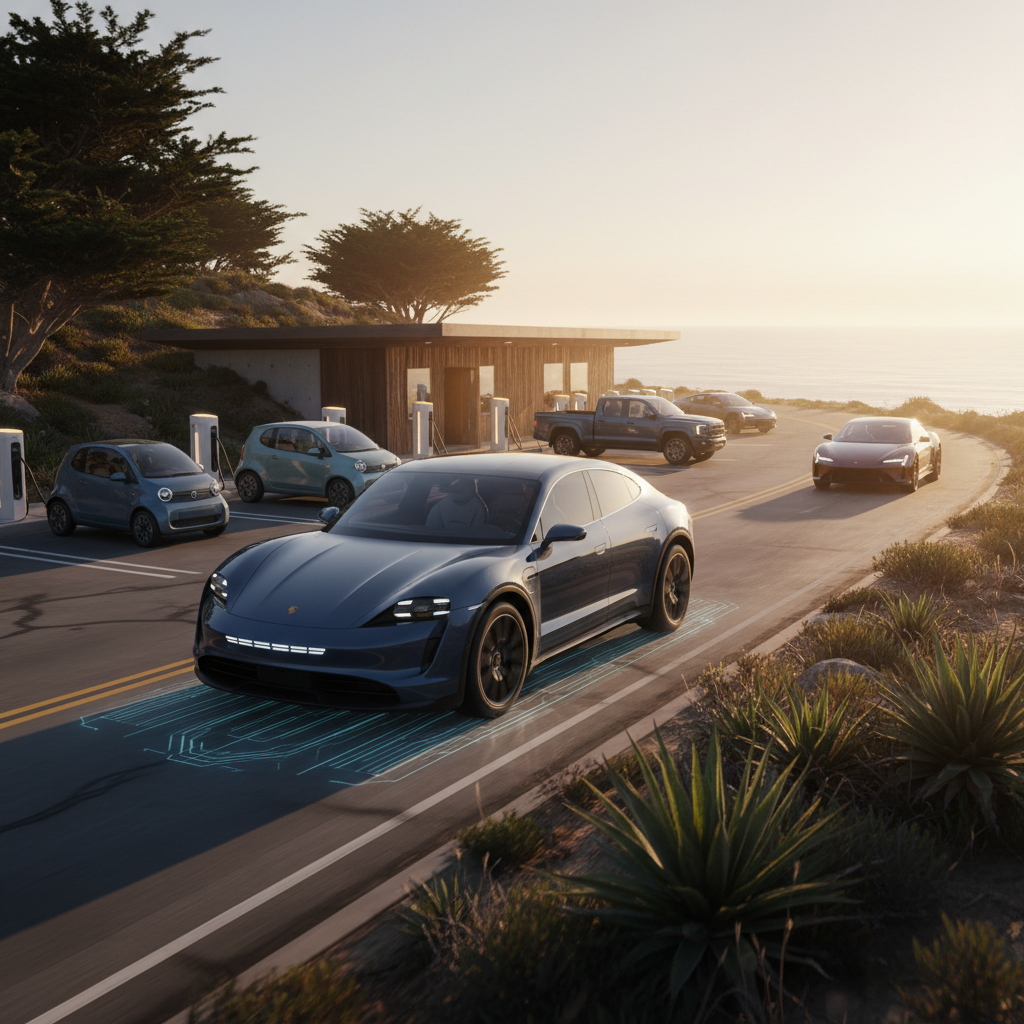If you’re trying to figure out which electric cars have the longest range, you’re not alone. In 2025 we finally have EVs that can comfortably cover 350, 400, even 500+ miles on a charge, but the spec sheet never tells the whole story. Let’s walk through which models truly go the distance, how their numbers are calculated, and how to choose a long‑range EV that actually fits your life and budget.
Key takeaway up front
Why EV range matters more than ever
A decade ago, an electric car with 200 miles of range felt impressive. Today, many shoppers won’t even consider an EV unless it promises 300 miles or more. That’s partly psychological, but there are some practical reasons:
- Road trips: Range is your margin of error when charging stations are busy, down, or spaced farther apart than the map suggests.
- Weather: Cold, heat, headwinds, and elevation can trim 15–30% off the number on the window sticker.
- Battery longevity: You’ll typically avoid charging to 100% and running down to 0%, which effectively shrinks usable range.
- Towing and hauling: For SUVs and trucks, a trailer or heavy cargo can dramatically raise energy use.
The good news is that today’s longest‑range EVs have moved well beyond “just enough” and into the territory where you can treat them like a normal car, especially if you choose carefully.
Quick answer: the longest‑range EVs in 2025
If you just want the short list, here are some of the electric cars with the longest EPA‑rated range in the U.S. for 2025, focusing on cars and crossovers rather than niche prototypes:
Current long‑range leaders at a glance
EPA‑rated figures; real‑world results will vary with speed, weather, and driving style.
Lucid Air Grand Touring
Approx. 512 EPA miles
Ultra‑luxury sedan and the current range champion. Expensive new, but increasingly available used.
Tesla Model S Long Range
About 400–405 EPA miles
Still one of the easiest ways to cover serious highway miles thanks to the Tesla Supercharger network.
Mercedes‑Benz EQS 450+
Around 390 EPA miles
Flagship luxury EV with a big battery and aerodynamic body that prioritizes comfort and range.
More 2025 long‑range contenders
These models live in the 330–360+ mile zone, often at much lower prices.
Hyundai Ioniq 6 Long Range RWD
Up to ~361 EPA miles (2024), ~342 for 2025 rating
Slippery aero sedan that punches well above its price in range and fast‑charging.
Tesla Model 3 Long Range
Roughly 341–363 EPA miles
A sweet spot of price, efficiency, and Supercharger access, especially on the used market.
Rivian & Chevy Long‑Range Trucks
400+ EPA miles (Rivian R1T/R1S Max pack, Chevy Silverado EV Max range)
Massive batteries built for towing and adventure, but pricing and efficiency reflect that.
EPA range vs. what you’ll actually see
How EV range is measured: EPA vs real world
When you compare which electric cars have the longest range, it helps to understand where these numbers come from. In the U.S., the EPA tests a combination of city and highway cycles, then applies a correction factor to estimate a realistic mixed‑driving number. That’s the EPA‑estimated range you see on window stickers and manufacturer websites.
Range reality check
Some manufacturers are conservative and often beat their EPA rating in the real world; others are more optimistic. That’s why it’s smart to look at both the official number and independent road tests when you’re comparing long‑range EVs.
Tip: Think in legs, not total range
2025’s longest‑range electric cars: full breakdown
Let’s dive deeper into the individual models that currently define the long‑range end of the EV market. Numbers below focus on U.S. EPA estimates where available as of late 2025.
Selected 2025 long‑range electric cars
Approximate EPA‑rated ranges and typical U.S. starting prices when new.
| Model (2025) | Body style | Approx. EPA range (mi) | Ballpark starting price (new) | Who it fits best |
|---|---|---|---|---|
| Lucid Air Grand Touring | Luxury sedan | ≈512 | $110k–$120k | Long‑distance luxury cruiser, frequent road‑trippers with budget to match. |
| Mercedes‑Benz EQS 450+ | Luxury sedan | ≈390 | $100k+ | Comfort‑first highway miles in classic Mercedes fashion. |
| Tesla Model S Long Range | Luxury sedan | ≈400–405 | Upper $70k–$90k | Drivers who prioritize range and Supercharger access over cutting‑edge interior design. |
| Hyundai Ioniq 6 Long Range RWD | Midsize sedan | ≈342–361 | Low–mid $40k | Buyers who want near‑luxury range and tech at a non‑luxury price. |
| Tesla Model 3 Long Range | Compact sedan | ≈341–363 | High $40k | Efficiency‑minded commuters and road‑trippers who want value and network strength. |
| Rivian R1T / R1S Max pack | Truck / SUV | ≈400+ | $80k+ | Adventurers and towers who truly need big‑battery capability. |
| Chevrolet Silverado EV Max Range | Truck | ≈450–460 | ~$90k–$100k | Truck buyers who must cover long distances between charges with a trailer in tow. |
| Kia EV6 Long Range RWD | Crossover | ≈310 | Mid $40k | Drivers who value fast charging and style more than sheer size. |
Always verify the exact configuration: wheel size, drivetrain, and options can change range by 10% or more.
A reassuring pattern

Best long‑range electric cars under $50,000
You don’t have to spend six figures to get serious range. Several mainstream EVs deliver 300+ miles for well under $50,000 new, and even less as used vehicles.
Long‑range EVs that won’t break the bank
These models deliver ~300+ miles of range with mainstream pricing.
Tesla Model 3 Long Range
EPA: up to ~363 miles (recent model years)
Often available used in the $30k–$40k band, with access to Tesla’s unrivaled fast‑charging network.
Hyundai Ioniq 6 Long Range RWD
EPA: roughly 342–361 miles
Fast 800‑volt charging, sleek aerodynamics, and a strong warranty make it a standout value.
Ford Mustang Mach‑E Extended Range RWD
EPA: around 320 miles
A practical crossover with solid range that now taps into the Tesla Supercharger network via NACS.
Used EVs: where value really shines
Used long‑range EVs: smart buys at Recharged
If you’re shopping used, the longest‑range new EVs become terrific values after their first few years of depreciation. The trick is to buy confidently, especially around battery health, the most expensive single component in the car.
Strong used long‑range candidates
- Tesla Model 3 Long Range – Abundant supply, strong efficiency, and Supercharger access make it a cornerstone of the used long‑range market.
- Tesla Model S Long Range – For buyers who value comfort and performance; just pay attention to wheel size and tire choice, which affect real‑world range.
- Hyundai Ioniq 5/6 Long Range RWD – Excellent fast‑charging and efficient designs increasingly available at approachable prices.
- Kia EV6 RWD – Another 300‑mile‑class crossover with quick charging and a long factory warranty.
How Recharged de‑risks used range
Every car listed on Recharged includes a Recharged Score Report with verified battery diagnostics, fair‑market pricing analysis, and a transparent condition overview.
- Battery health data so you’re not guessing whether a 310‑mile EV still delivers 290, or only 240.
- History and usage insights that flag unusually hard use or fast‑charging patterns.
- EV‑specialist guidance to help you compare real‑world range between models, not just brochure numbers.
- Financing, trade‑in, and nationwide delivery so you can shop long‑range EVs from your couch.
Beyond the number: what really affects EV range
Two cars can share the same EPA range but feel very different to live with. That’s because several factors quietly shape how much of that headline number you actually see on the road.
- Speed: Aerodynamic drag rises quickly above 65 mph; at 75–80 mph you may see 15–25% less than EPA range.
- Temperature: Cold batteries are less efficient, and cabin heat in winter can be a major energy draw.
- Terrain: Long climbs eat energy; long descents can give some back via regenerative braking but usually not all.
- Wheels and tires: Larger wheels and stickier performance tires can trim 5–10% from range.
- Payload and towing: Extra passengers, cargo, or a trailer can dramatically raise consumption in SUVs and trucks.
- Software & driving mode: Eco modes, preconditioning, and route‑aware navigation can meaningfully improve real‑world range.

Don’t size range for the worst‑case week
How much range do you actually need?
When you’re staring at numbers like 260, 310, 360, and 500+ miles, it’s easy to get fixated on the top of the chart. But for most drivers in the U.S., the right answer is simpler, and less expensive.
Daily commuters
If you drive 30–60 miles a day and can charge at home or work, a car with 240–280 EPA miles is usually plenty. Bigger batteries won’t change your routine.
Weekend travelers
If you regularly do 150–250‑mile weekend trips, look for 300–340 EPA miles. That lets you cruise at highway speeds with one comfortable fast‑charge stop.
Frequent road‑trippers
If you often cross states by car, a 340–400+ mile EPA EV makes planning easier, but fast‑charging speed and station coverage matter just as much.
Think about the network, not just the range
Checklist: choosing the right long‑range EV
9 questions to answer before you buy
1. How many miles do you actually drive per day?
Grab a week or two of real‑world data from your current car’s trip computer or a phone app. You may be surprised how little range you truly need.
2. Where will you charge most of the time?
Home Level 2, workplace, or public? Home charging makes slightly shorter‑range cars feel bigger because you start every day topped off.
3. Do you take regular long highway trips?
If yes, pay close attention to both <strong>EPA range</strong> and <strong>DC fast‑charging speed</strong>. A smaller battery that charges very quickly can rival a larger, slower‑charging pack.
4. How important is comfort vs. outright efficiency?
Low, sleek sedans go far on a kWh. Taller crossovers and trucks ride higher and carry more, but pay a penalty in energy use.
5. Are you planning to tow or haul heavy loads?
If you’ll tow regularly, a big‑battery truck or SUV might make sense, but understand that towing range can be half the EPA figure.
6. What’s your true budget, including financing?
Be honest about payment comfort. A well‑chosen used long‑range EV can free up cash for travel, charging setup, or even solar at home.
7. How long do you plan to keep the vehicle?
Longer ownership favors models with strong track records on battery durability and support. Recharged’s battery reports can help you compare real‑world degradation trends.
8. Which driver‑assist and safety features matter most?
Adaptive cruise, lane‑keeping, and blind‑spot systems can take the edge off long drives, especially when you’re taking advantage of that big battery on road trips.
9. Who will support you after the sale?
EVs are different from gas cars. Access to <strong>EV‑literate support</strong>, like the specialists at Recharged and our Experience Center in Richmond, VA, can make ownership far smoother.
FAQ: longest‑range electric cars
Frequently asked questions about long‑range EVs
Bottom line: finding the right long‑range EV
When you ask which electric cars have the longest range, names like Lucid Air, Tesla Model S, Mercedes EQS, and Hyundai Ioniq 6 naturally rise to the top. But the real question is which EV gives you enough comfortable range at a price that makes sense, backed by charging you can actually use where you live and drive.
For many buyers, that means targeting a 300–360‑mile EV with strong fast‑charging and a proven battery, rather than chasing the single highest number on the chart. And if you’re open to used, Recharged can help you zero in on long‑range EVs that still deliver the miles they promise, backed by transparent battery‑health data, fair pricing, and EV‑savvy support from start to finish.



